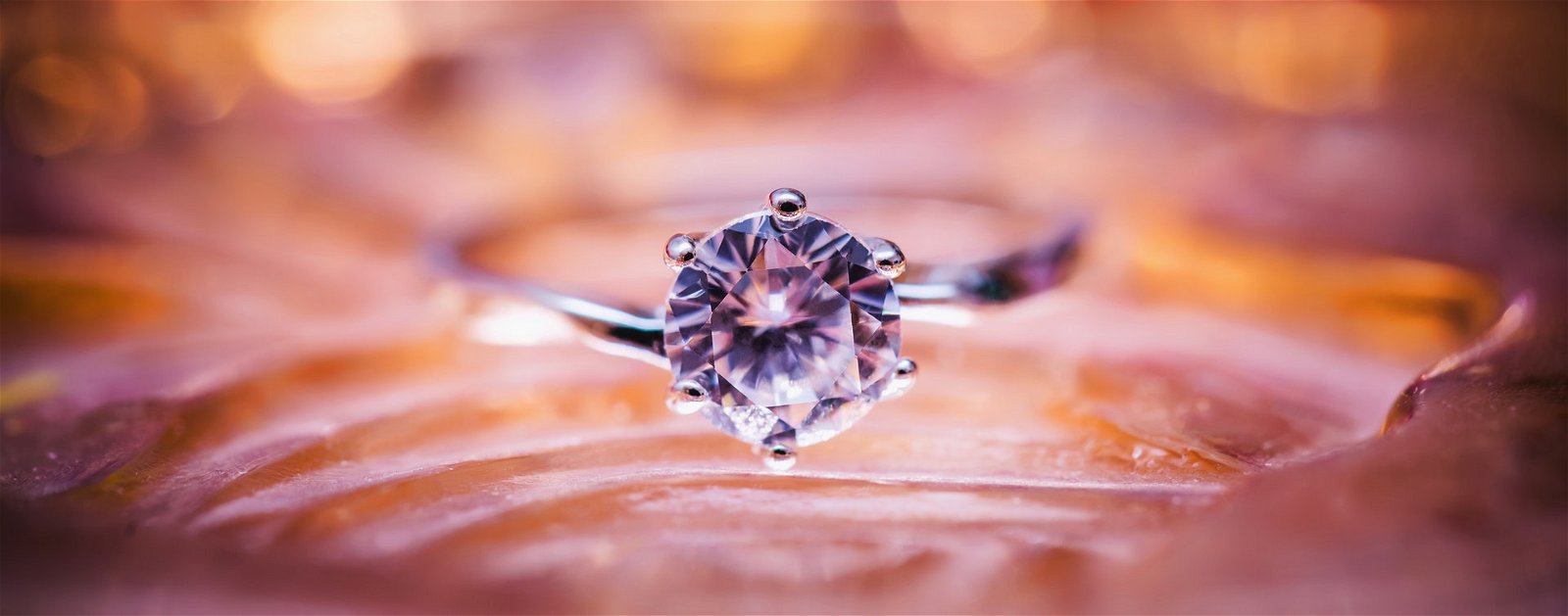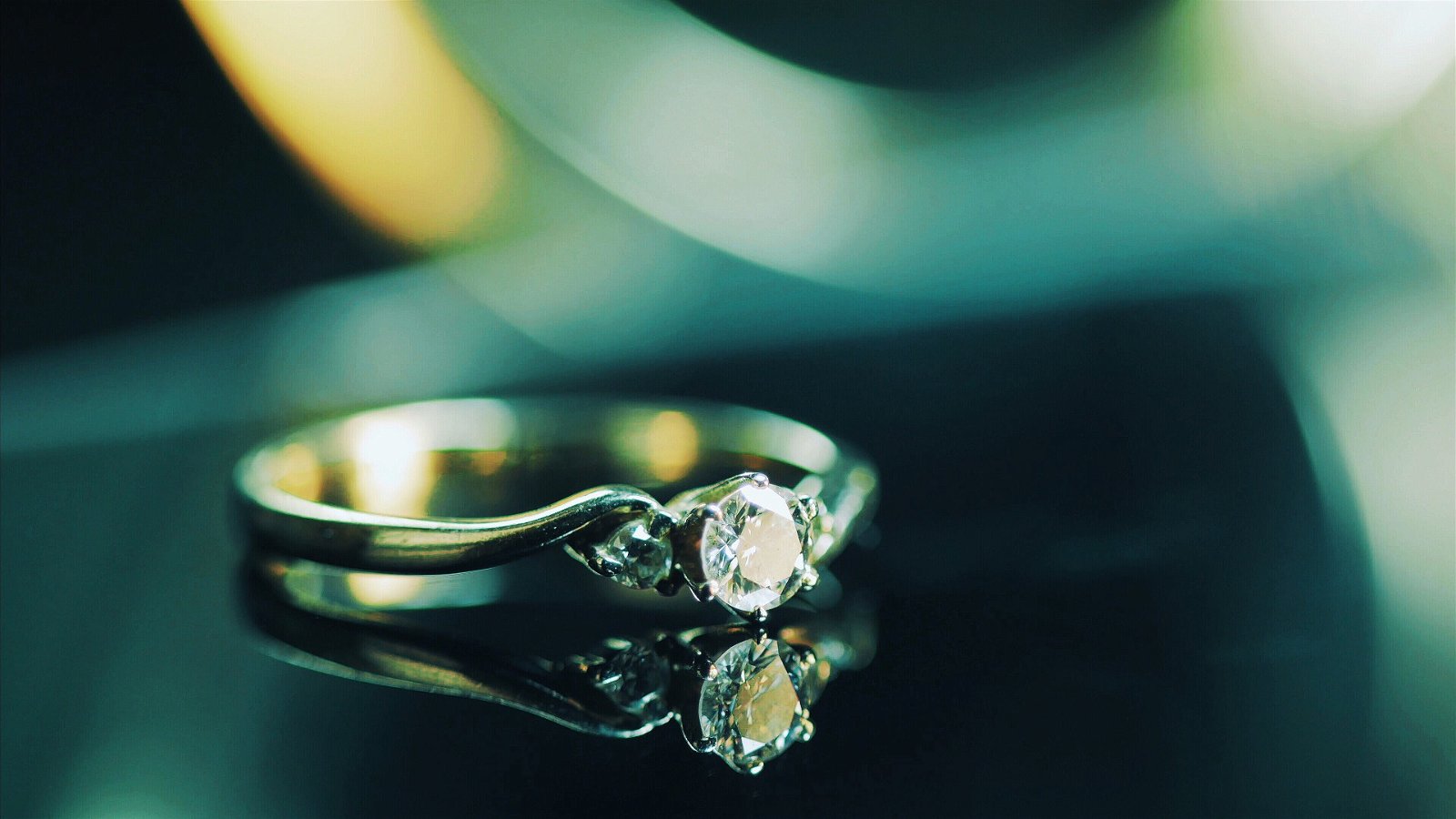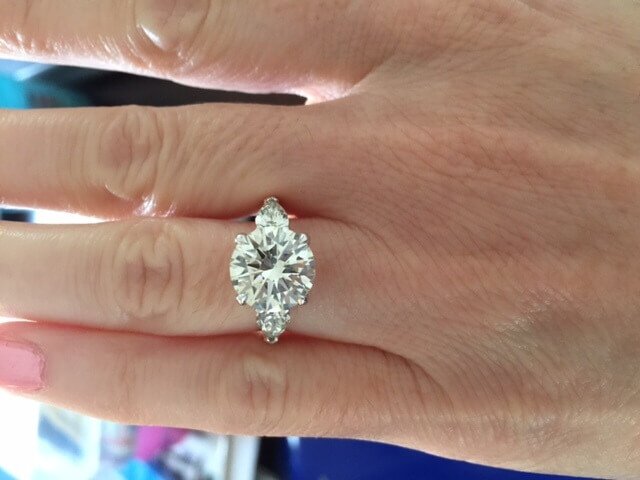You're seeing this ad based on the diamond's relevance to your search query.
These diamonds are recommended to you based on the inputs to the calculator.
StoneAlgo's Fair Price Estimate is like a Zillow Zestimate for diamonds. This estimate is based on machine learning analysis of ^sa-replace_text_0^ diamond inventory sourced from top online jewelers. Our fair price estimate is not an offer to buy or sell diamonds.
There are certain factors that may not be considered in a price estimate. As a result, there are categories of diamonds that may have more fluctuation in their market prices. These include fancy colored diamonds, diamonds with strong+ fluorescence, and diamonds with a clarity grade of SI1 or lower.
This is the range you would expect to see for ^sa-replace_text_0^ diamond prices based on today's price estimate and variance in prices from top online jewelers.
Keep in mind that the more data we have for a given diamond category the better the estimate range will be. So, for more rare requests (e.g. 4 Carat Marquise K IF diamonds) the range may be very wide.
Over the past 30 days our fair price estimate for ^sa-replace_text_0^ diamonds has ^sa-replace_text_1^
You can view more price charts and price indexes at our dedicated Diamond Price Index page.
Price per carat is calculated by dividing our price estimate by the diamond's carat weight. Our "Estimate Price per Carat" of ^sa-replace_text_0^ is equal to our "Estimate Price" of ^sa-replace_text_1^ divided by the "Carat Weight" of ^sa-replace_text_2^
Price per carat is a useful metric when comparing diamonds of different sizes. For example, a 1 Carat diamond with a price per carat of $4,023 would have a total price of $4,023 x 1 = $4,023. A 2 Carat diamond with a price per carat of $4,023 would have a total price of $4,023 x 2 = $8,046.
Diamond Price Calculator
Use our free diamond price calculator to estimate the current retail price for diamonds. Our price estimates are updated daily based on our massive database of online jeweler inventory sourced from top-rated jewelers. To see more diamond data and up-to-date price charts, visit our diamond price indexes page.
Updated: Saturday December 13, 2025
Calculating...
Frequently asked questions
Get answers to the most frequently asked questions regarding diamond prices.
- Are diamond prices going up or down?
- Over the past month, natural diamond prices have fallen by -1.05% and lab grown diamond prices have fallen by -3.08%. These price changes are based on 1 carat diamond prices for all diamond shapes as tracked by our proprietary diamond price indexes.
- How often are your prices updated?
- The most recent update to our diamond price calculator occurred on Saturday December 13, 2025. StoneAlgo's diamond price calculator and all Fair Price Estimates are updated daily based on our proprietary database of over 2 million live diamond prices. To see actual diamonds and prices from multiple jewelers all in one place, check out our diamond search engine.
- What is StoneAlgo's Fair Price Estimate?
- Our Fair Price Estimate measures the approximate retail price for a specific diamond (such as a Round 1 Carat G VS2 diamonds). The price estimates are designed to help diamond shoppers make more informed purchases.
- Looking for an even more accurate price estimate? You can generate a custom price estimate based on your diamond's certificate number using our diamond check tool
- How do you calculate the diamond price estimates?
- StoneAlgo’s diamond calculator and Fair Price Estimates use an advanced formula, similar to Zillow’s Zestimate in the US housing market. Our pricing model utilizes our proprietary database and is updated with over 2 million diamond prices each day. These prices come from our online jeweler partners and various other websites.
- Why is a jeweler quoting me a higher (or lower) price than the Fair Price Estimate?
- Diamond prices can vary significantly for a number of reasons, and a higher price isn’t necessarily a bad thing. Here are the most popular reasons why a diamond’s actual retail price may differ from our diamond price estimates:
- Grading Agency/Lab: Generally speaking, GIA certified diamond’s sell at a premium to diamond’s graded by other grading agencies such as the IGI and EGL. Our natural diamond price estimates are based on GIA graded natural diamond prices. Our lab grown diamond price estimates are based on GIA and IGI lab grown diamond prices.
- Diamond Quality: Diamond prices can vary even within a specific type of diamond (e.g. Round 1 Carat G VS2 diamonds). One reason is that a selection of diamonds that received the same “paper grades” can look different from one another in real life. For example, some diamonds graded as SI1 clarity may look perfectly “eye clean” and others may have imperfections that make the diamond look cloudy, hazy, or otherwise hurt the appearance of the diamond. The best SI1 diamonds may cost more than our price estimate predicts, and the worst ones may be far cheaper.
- Jeweler Pricing: Every jeweler has its own pricing margins which depend on costs associated with rent, personnel, shipping, return policies, and the jeweler's profit margin.
- Dealer Pricing: Online and local jewelers typically source their diamond inventory from a vast network of diamond dealer relationships. Different dealers have difference prices, but the overall market is very competitive and dealers tend to price based on quality.
- Lab v. Natural: If you are seeing a retail price that is significantly higher or lower than our price estimate, you should check whether the diamond is lab or natural. Lab grown diamonds cost far less than natural diamonds. Our diamond price calculator allows you to calculate natural or lab grown price estimates, just select the appropriate diamond type at the top of the calculator inputs section.
- How much is my diamond worth?
- The easiest way to estimate the value of a specific diamond is to look at prices for similar diamonds available for sale from online and local jewelers. Online jewelers tend to offer lower and more transparent prices, which is a more realistic indication of your diamond’s actual value.
- If you are considering selling a diamond, you should know that you will not receive 100% of the current retail price for your diamond. This is due to a number of factors described below.
- Do diamonds lose resale value?
- Yes, diamond’s typically lose resale value after retail purchase for a number of reasons including:
- Selling C2B: Most online re-sale services help you sell your diamond to businesses in the diamond industry. These types of transactions are known as Consumer-to-Business (C2B) sales. When selling a diamond C2B, the businesses that buy diamonds can only afford to pay prices below retail pricing so they can make a profit when they re-sell the diamond. Some online re-sale services have a network of hundreds or thousands of diamond wholesalers who bid competitively for your diamonds or jewelry. But, they aren’t willing to pay anywhere near retail prices.
- Selling C2C: Some websites help you sell C2C, but they tend to recommend selling well below retail prices, offer buyers the ability to negotiate on the price, are much slower than C2B services, and charge higher fees. These sites have struggled to gain traction because they offer relatively low inventory which means they struggle to attract diamond shoppers who prefer the extensive inventory available at online jewelers’ websites.
- Trust: Did you buy your diamond from an individual or an established brand? You could try selling your diamond on eBay, but most diamond shoppers prefer to pay a higher price for a diamond from a reputable retailer who offers 30-day returns and has an established brand to protect. So, in order to overcome this reputational hurdle you’ll typically need to sell for a below retail price. Even then, it can be very difficult to navigate a diamond re-sale and attract buyers on a website that isn’t designed specifically for this purpose.
- Liquidity: Liquidity is another way of saying - you have a very particular diamond and need to find a buyer who wants to buy that exact type of diamond. When you sell your diamond with an online service you can sell it much faster because they have a larger pool of interested people looking for diamonds like yours.
- Other Costs: When a jeweler sells a diamond, they calculate a markup based on the jeweler’s overhead, marketing expenses, return policy, shipping costs, time spent with the client, and desired profit margin. When an online service helps you sell your diamond C2B or C2C, they have similar costs and must charge a margin as well.
- If you’d like more information on diamond selling, we conducted an experiment to find the best places to sell your diamond.
- How can I calculate my diamond's resale value?
- Based on the analysis in our diamond selling experiment, the current resale value for a diamond is about 50% of the lowest available retail price for the same type of diamond. Using our diamond price calculator you can come up with an expected retail price and then multiply it by 0.5 to get to a resale estimate. That said, certain diamonds sell for closer to retail and certain sell for far less than retail price. This tends to depend on the size, quality, and retail value of the diamond. If the diamond is significantly large, in demand, and of superior quality, then it should sell for closer to retail (though you should still expect a steep discount to retail pricing).
- How do I calculate price per carat?
- Price per carat is equal to a diamond’s total price divided by its carat weight. To calculate price per carat using our diamond price calculator, simply divide our price estimate by carat weight. As a simple example, if a 3 carat diamond shows a price estimate of $30,000 then the price per carat for that diamond is $10,000 ($30,000 divided by 3.00).
- How can I calculate my diamond’s appraisal value online?
- If you’re looking to get your diamond insured you’ll need an appraisal of your diamond jewelry. As you can see in our diamond price charts, diamond prices are continuously changing with the market, meaning it’s a smart idea to update your insurance policy every so often to reflect the present value of your possessions. If you’re looking for the appraisal value of a loose diamond, StoneAlgo’s diamond price estimate is a great place to start. If you’re looking for an even more accurate diamond appraisal value for a GIA or IGI certified lab-grown diamond or natural diamond, you can use our diamond check tool to generate a more specific price estimate.
- Disclaimers
- Please do your own due diligence when buying or selling diamonds and do not simply rely on the price estimate as a final source of truth. StoneAlgo’s diamond price calculator and Fair Price Estimates are not an indication or an offer to buy or sell your diamond. Our price calculations rely on 3rd party data and are calculated automatically on a daily basis. We cannot guarantee the accuracy of our prices or that they have been updated within the past 24 hours, for numerous reasons including the potential for internal errors. Our price estimates may vary significantly from the true value or price of your diamond due to the numerous reasons outlined above and others we have not considered or mentioned. If you feel there is an issue with or have any questions regarding our Diamond Price Estimates, please contact us at management@stonealgo.com.
From the blog
Check out these articles for even more information on 1 carat, 2 carat and 3 carat diamonds and pricing information.
© 2025 StoneAlgo, Inc. All rights reserved.












